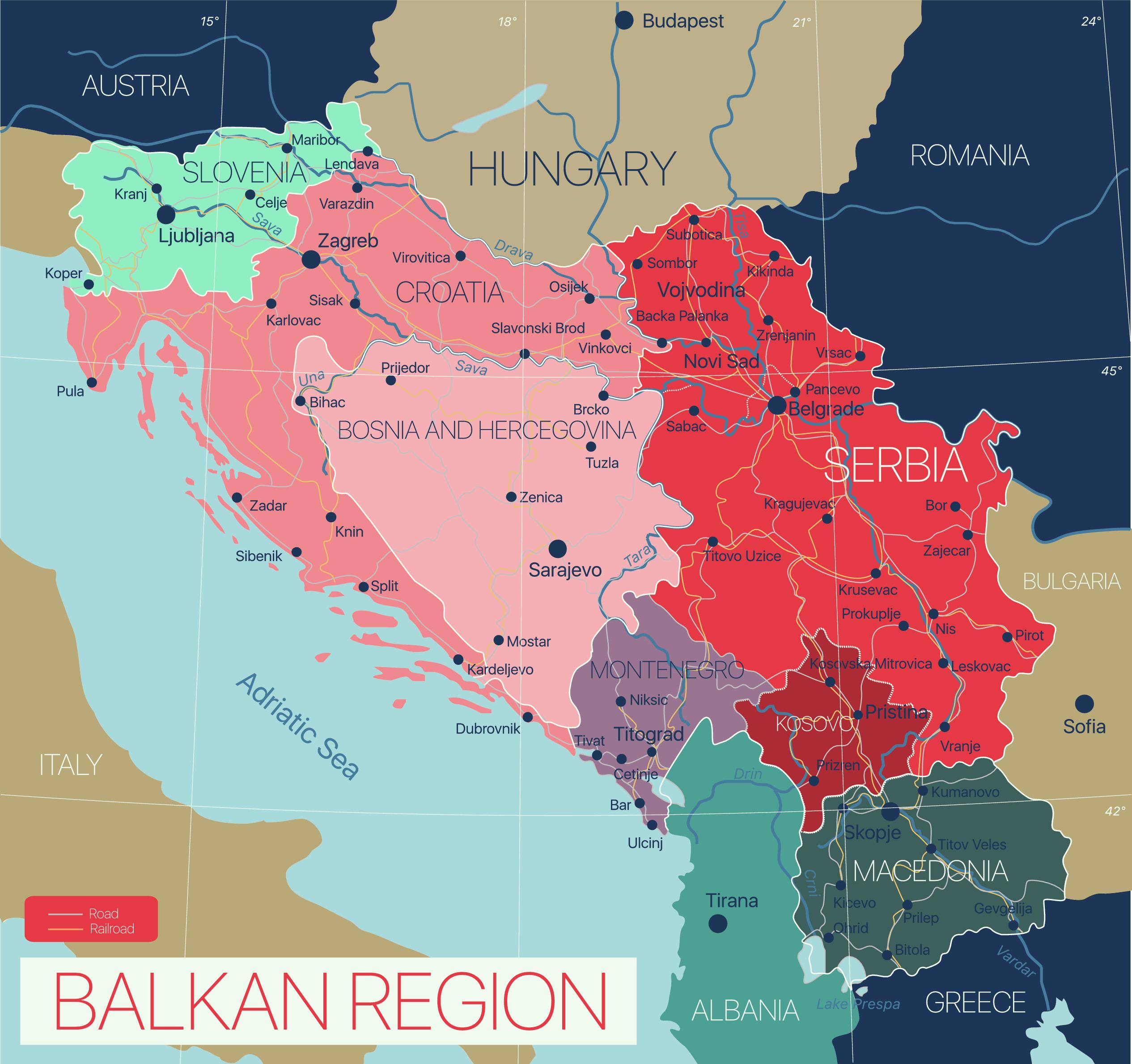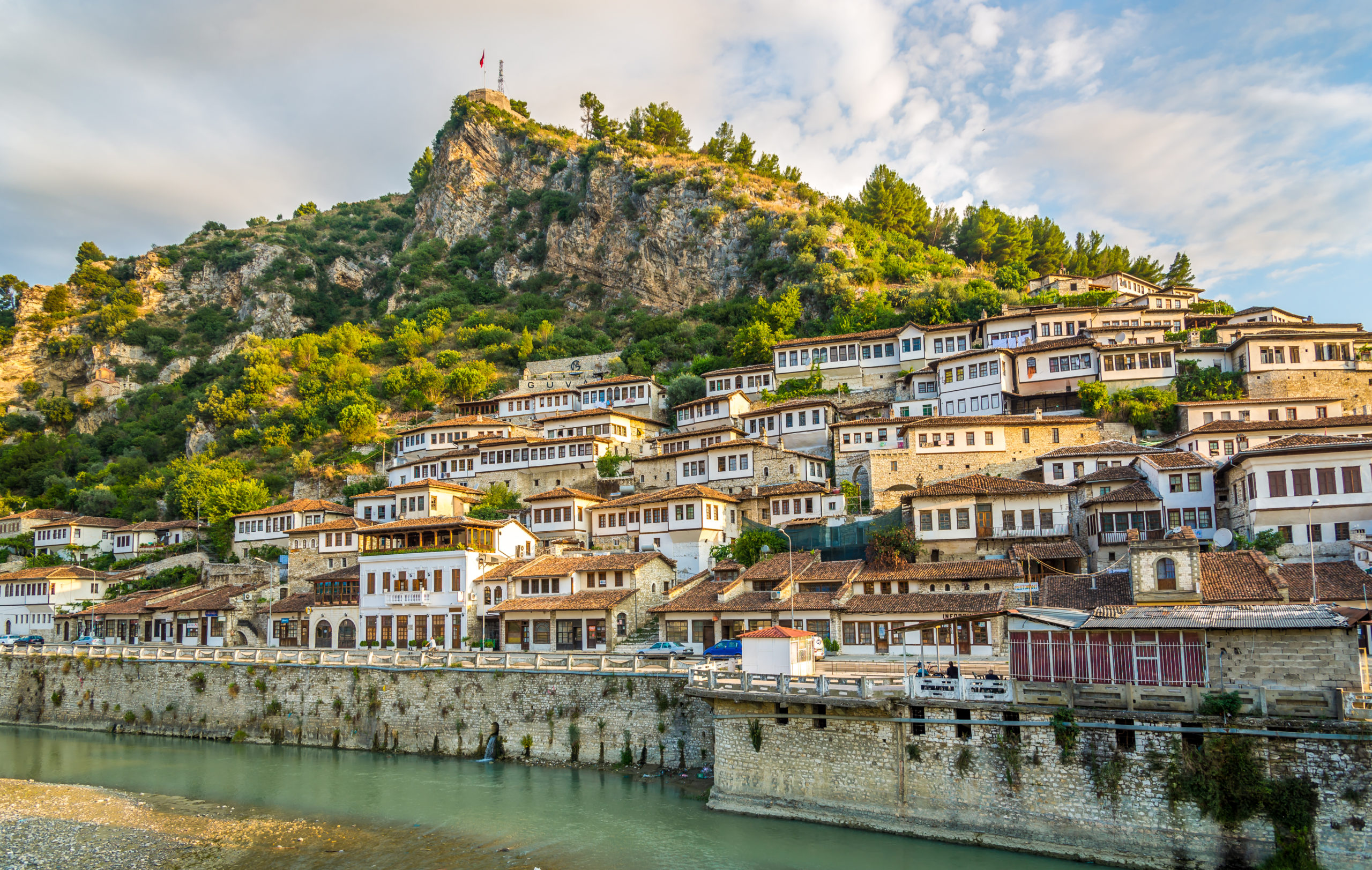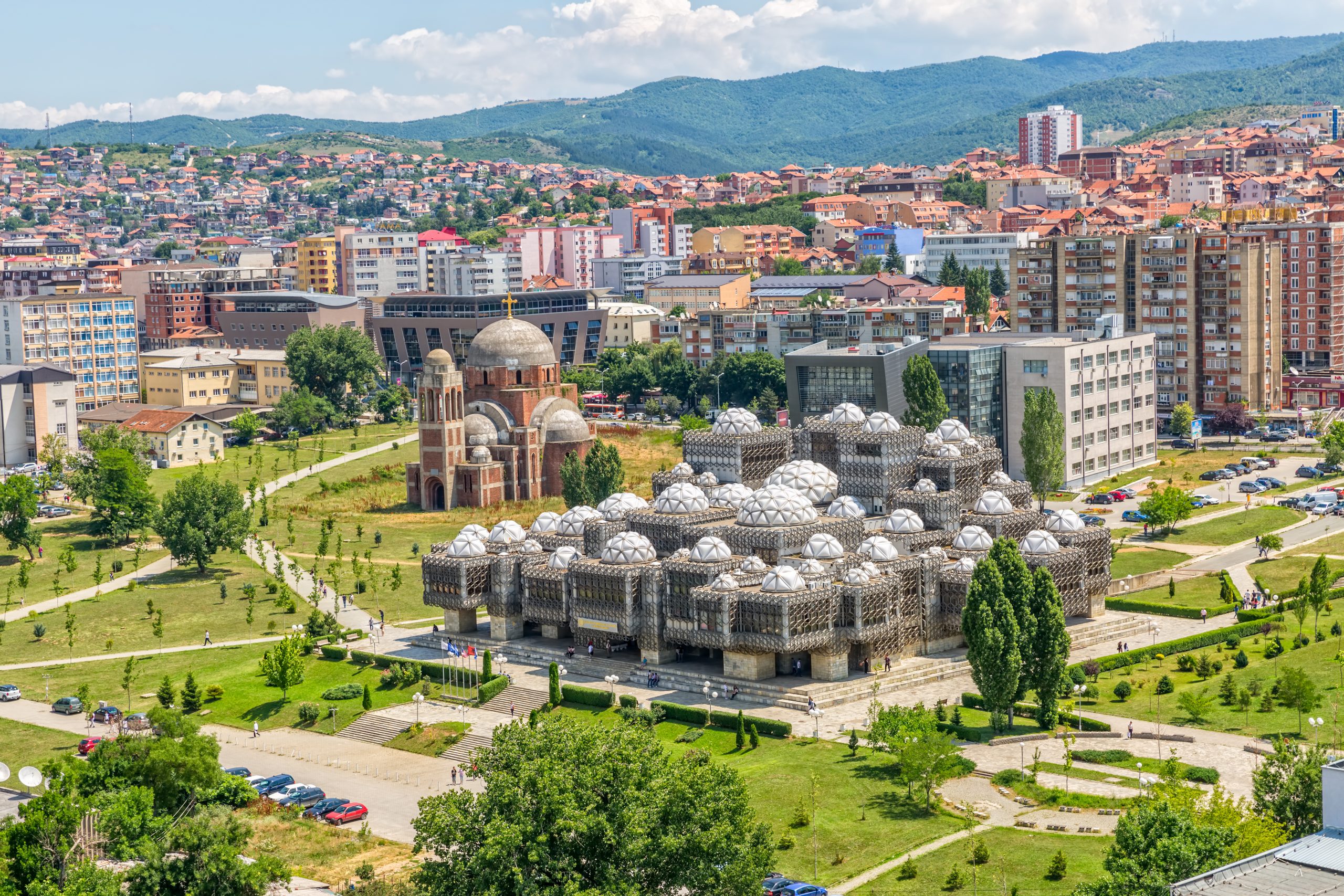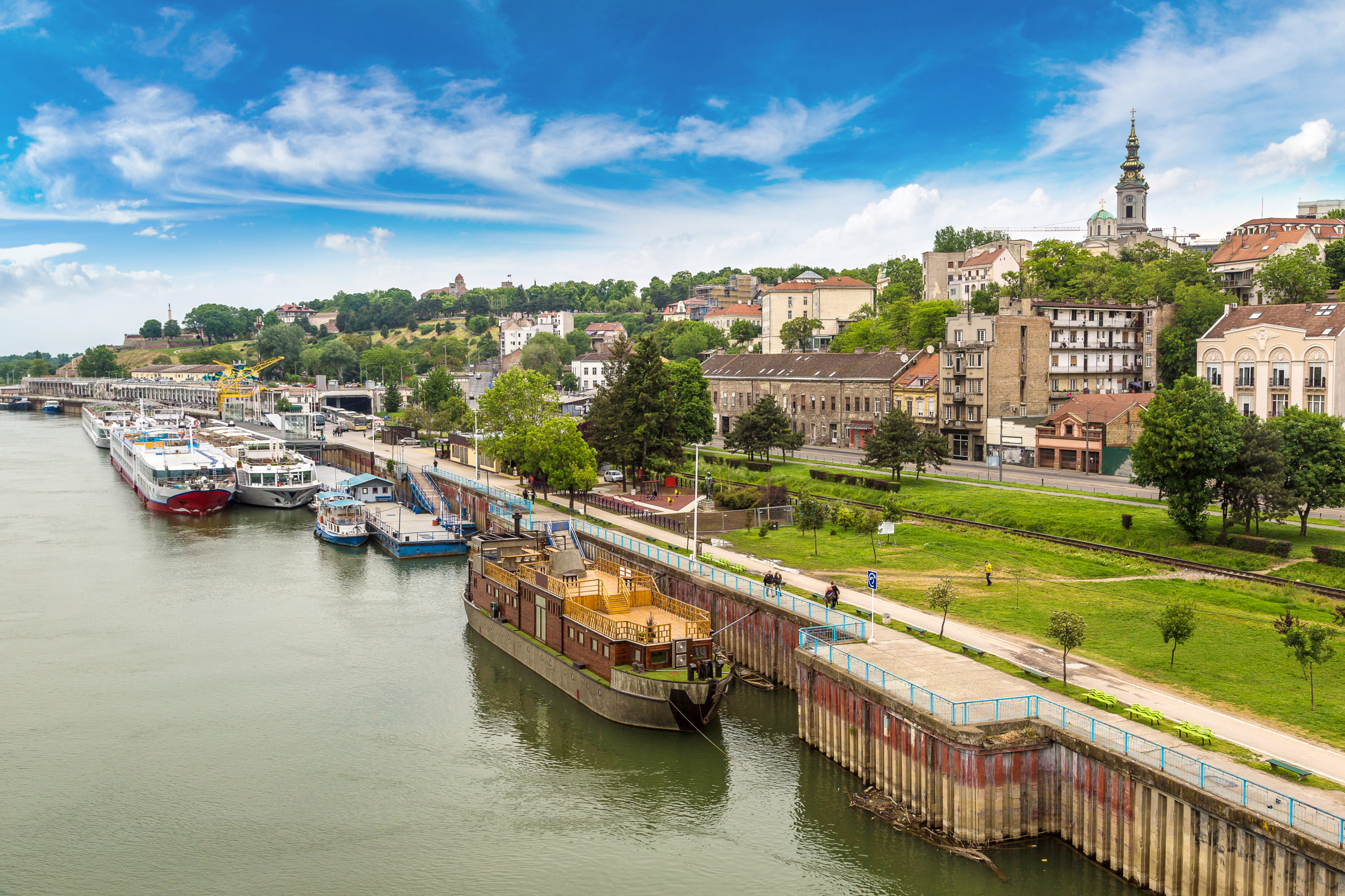Strategic Analysis Balkan Brief
The first half of June 2023
Petra Bošková, Victoria Valová, Zuzana Šmilňáková, Štefan Talarovič, Chiara Mihalčationová, Lýdia Chobotová, Natália Lešňovská, Barbora Tomanová

Map of the Balkan region; Graphics: Olinchuk/Shutterstock
Albania
Ex-MP of Ruling Party to Lead Albania’s Public Broadcaster
On Tuesday, June 13, 2023, Alfred Peza was appointed as the new General Director of Albania’s national radio and television broadcasting service. According to BIRN, the Balkan Investigative Reporting Network, the appointment of Peza violates the law on Audiovisual Media.
Politicians who served as deputies in the previous two legislatures, candidates for deputies in those legislatures, members of political parties or organisations, or local elected officials are not eligible to run for the position of the head of public television under the provisions of the Law on Audiovisual Media.
As a result, the election of Peza by the Governing Council of Albanian Radio and Television (RTSH) raised concerns regarding the independence of the service because he served as the Socialist Party’s spokesperson during the 2013–2017 parliamentary term and later its “digital secretary”. He maintained his political roles after 2017. Although he was no longer listed as a candidate for the Socialist Party, he continued working as the party’s director until September 2021.
Alfred Peza was elected from a group of four contenders for this leadership post by all nine members present at the closed-door meeting, who unanimously cast their ballots. Laureta Roshi, Enrik Mehmeti, and Helidon Haliti comprised the other contenders for the position.
Peza was employed as a deputy and subsequently as secretary of Media Relations and Civil Society until September 2021, but according to the Governing Council, he met the criteria. Leka Bungo, the board’s chairman, informed BIRN that Peza’s appointment did not contravene the law, which bars any member of a political party or any person who served as an MP in the previous two legislatures from serving as the head of the Albanian Broadcasting Service. Peza provided the board with documentation proving he is not a member of the Socialist Party, claims Bungo.
As the head of the wealthiest media group in Albania, the new General Director will oversee a yearly budget of more than 20 million EUR, primarily funded by tax revenues.
Sources:
- Gjergj Erebara, Balkan Insight, 2023, „Ex-MP of Ruling Party to Lead Albania’s Public Broadcaster„, https://balkaninsight.com/2023/06/13/former-sp-mp-elected-general-director-of-albanias-public-broadcaster
- Politiko, 2023, „The former spokesman of the SP is elected director of RTSH in open violation of the law“, https://politiko.al/english/e-tjera/birn-ish-zedhenesi-i-ps-zgjidhet-drejtor-i-rtsh-se-ne-shkelje-te-hapur-t-i485091
Bosnia and Herzegovina
Two Serbian State Officials Sentenced for war crimes in the Bosnian War
The UN-administered International Residual Mechanism for Criminal Tribunals, which took over from the International Criminal Tribunal for the Former Yugoslavia, issued its final verdicts for Jovica Stanišić and Franko “Frenki” Simatović on May 31, 2023. Both individuals held high-ranking positions in the Serbian security apparatus during the regime of Slobodan Milošević. Stanišić was formerly the head of the state security service, while Simatović served as his deputy in charge of special forces.
This ruling is significant as it represents the definitive sentencing of Serbian state officials and confirms the direct involvement of Serbia in the atrocities committed in Croatia and Bosnia and Herzegovina during the 1990s wars.
Two men were sent to Hague in 2003, they were initially on trial for providing financial, organisational, supply, and training aid to Serbian security units operating in Croatia and Bosnia and Herzegovina from 1991 to 1995. In 2013, the court acquitted them, as the presiding judge Alphons Orie noted that their goal was not to commit war crimes, despite their assistance to the units. However, the appeals chamber overturned this ruling in 2015 and ordered a retrial with new judges and all evidence and witnesses presented anew. The retrial began in 2017, and in June 2021, the verdict was announced, sentencing both men to 12 years in prison for aiding the special unit that committed war crimes in the Bosanski Samac area.
The defence appealed the verdict with the intention of convincing the court to either acquit convicts altogether or at least shorten their sentences. However, the prosecutors were not content with the 2021 ruling either, as they sought to convict them of much larger participation in the joint enterprise to ethnically cleanse the territory of Croatia and Bosnia and Herzegovina from non-Serbs. On May 31, the appeals chamber sided with the prosecutorial side when it lengthened both sentenced to 15 years and confirmed the involvement of the convicts with the larger ethnic cleansing campaign.
The court decision closed the longest case from the Yugoslav wars on trial in Hague. Throughout its existence, the court has accused more than 160 individuals of war crimes. Among those sentenced was, for example, the commander of Bosnian-Serb militias Ratko Mladic. The court was a part of larger efforts to bring transitional justice to the region divided by the bloody war.
Sources:
- Al Jazeera, “Sentences for Milosevic allies extended in ‘milestone’ ruling”,https://www.aljazeera.com/news/2023/5/31/un-judges-extend-sentences-for-milosevic-allies-in-tribunals-case
- Emina Dizdarevic, Balkan Transitional Justice – Balkan Insight, “Serbian Wartime State Security Chiefs’ Appeal Verdict Due on May 31”, https://balkaninsight.com/2023/05/16/serbian-wartime-state-security-chiefs-appeal-verdict-due-on-may-31/
- Milica Stojanovic a Lamija Grebo, Balkan Transitional Justice – Balkan Insight, “Serbian Security Chiefs Appeal Conviction for Aiding War Crimes”, https://balkaninsight.com/2021/09/07/serbian-security-chiefs-appeal-conviction-for-aiding-war-crimes/

Berat, Albania. Photo: Shutterstock.com
Croatia
The Catholic Church of Croatia Announces Cases of Child Abuse
On Monday, May 22, 2023, Mate Uzinic, the archbishop of Rijeka, discussed the complaints and inquiries he has made into claims of clergy sexual abuse of children and minors during the past 2.5 years. He found nine cases that have occurred over the past 30 years.
The Catholic Church is by far the most prevalent religion in Croatia. It has treaties that regulate its relationship with the state and has a strong reputation among the populace. It also has a significant social impact, therefore, these kinds of foundlings sparked debates and polarisation among the general public as well as among members of the Church. The impact it made was only strengthened due to the Church’s affiliation with some problematic historical figures. For instance, the Catholic Church of Croatia holds the yearly memorial mass in Zagreb and Split in December as a tribute to Ustasha fascist dictator Ante Paveli.
One of the disclosed cases concerned a priest, Milan Spehar, former rector of Rijeka’s Catholic Faculty of Theology. The accused acknowledged that 13 boys between the ages of 6 and 13 had been molested by him during 1987, 1988, 1992–1993, and maybe 1994. Additionally, he requested his own removal from the priesthood and reported himself to the police. The victim of Spehar spoke: „he abused me at least once a month, from the second to the seventh grade”.
Mate Uzinic had already given the State Attorney’s Office a report on every case and informed the competent Church Dicastery about the findings of the inquiries. However, the inquiry against Milan Spehar has already shown to be rather lengthy and ineffective. Additionally, because Spehar expelled himself from the clergy, the Catholic Church no longer had jurisdiction over him. This led to criticism from the Office of the Ombudsperson for Children, which highlighted the lack of or mildness of the penalties for those who commit such offences in Croatia.
Sources:
- Vuk Tesija, ,,Croatia’s Catholic Church Goes Public on Child Abuse Cases”,https://balkaninsight.com/2023/05/24/croatias-catholic-church-goes-public-on-child-abuse-cases/
- National.hr, ,,Nakon Otkrića Nacionala: Progovila žrtva svećenika Špehara: ,,Zlostavljao me najmanje jednom mjesečno, od drugog do sedmog razreda”, https://www.nacional.hr/nakon-otkrica-nacionala-progovorila-zrtva-svecenika-spehara-zlostavljao-me-najmanje-jednom-mjesecno-od-drugog-do-sedmog-razreda/
Kosovo
Tensions rise in northern Kosovo amid swearing-in of local officials
On May 29, 2023, the day after new Albanian mayors in Serb-majority municipalities took their oaths after disputed elections in northern Kosovo, in which barely 4% of people voted, violence started in the streets. There were reports of gunshots, burning police cars, use of tear gas, and dozens injured as local Serbs clashed with the police while the local Serbs were trying to prevent the new mayors from entering offices. Meanwhile, Serbian President Vucic told his army to raise their combat readiness and move to the administrative line with Kosovo. Similarly, the NATO peacekeeping mission KFOR present in Kosovo increased its presence in the area to ensure a safe and secure environment.
The EU and US condemned the use of violence by the Kosovo police, urged the new Albanian mayors not to take any measures that would spark further violence and emphasised the importance of implementing the normalisation agreement between Kosovo and Serbia. However, the violence continued, and reports of 50 injured protesters and 30 injured KFOR officers emerged. Kosovo Police released a statement saying the protesters “have continually been non-peaceful and have provoked the situation,” leading to injuries and further damage to police and army vehicles. Thus, the police began to arrest people on the grounds of attacks and violence, and KFOR increased its number of troops. Vucic spoke to the media and blamed Kosovo PM Kurti for organising everything “with his desire to bring about a big conflict between Serbs and NATO”.
Later, the US announced that they were planning to sanction Pristina for the public unrest by cancelling Kosovo´s participation in a military exercise and ceasing efforts of pursuing countries to recognise Kosovo. After further Western pressure, both Kosovo PM Kurti and President Osmani announced that Kosovo is open to new elections in the Serb-majority municipalities in northern Kosovo. Furthermore, the EU High Representative Josep Borrell held a meeting with Vucic and Osmani, where he laid out EU (and US) requests for both parties to de-escalate the tensions – new elections with the participation of Kosovo Serbs and the implementation of the Association of Serbian Majority Municipalities.
On June 12, PM Kurti proposed to Borrell a 5-point plan with the aim of defusing tensions in the Serb-majority municipalities. The plan includes new elections and the continuation of EU-facilitated dialogue between Kosovo and Serbia
Sources:
- Xhorxhina Bami, Balkan Insight, “Kosovo Eyes Consequences as Deadline for US, EU Demands Approaches”, https://balkaninsight.com/2023/06/07/kosovo-eyes-consequences-as-deadline-for-us-eu-demands-approaches/
- Xhorxhina Bami, Adelina Ahmeti & Shkodrane Dakaj, Balkan Insight, “Kosovo Serbs Continue Protests Against New Mayors in North”, https://balkaninsight.com/2023/05/29/kosovo-serbs-continue-protests-against-new-mayors-in-north/
- Xhorxhina Bami & Sasa Dragojlo, Balkan Insight, “US Blames Kosovo for Violence in North as Disputed Mayors Enter Offices”, https://balkaninsight.com/2023/05/26/us-blames-kosovo-for-violence-in-north-as-disputed-mayors-enter-offices/

Prishtina, Kosovo. Photo: OPIS/ Shutterstock.com
Montenegro
Pro-EU movement set to form a new government after the snap election
On Sunday, June 11, more than half a million Montenegrins had an opportunity to put an end to the era of prolonged political instability and erosion of the rule of law. Although the parliamentary elections were well-organised and pluralistic, the deteriorating economy and living standards led to a series of unrealistic promises. Contrary to the past, the diplomatic orientation of parties which traditionally differ according to their staunchly pro-Serbian, pro-Russian, or pro-Western stance, did not dominate the political debates. Frequent early elections that produced no major changes on the local political scene have resulted in the lowest voter turnout since its split from Serbia in 2006. According to the OSCE, a divisive campaign deepened by a polarised media ecosystem and lack of gender equality might have contributed to the overall frustration of the public.
As the pollsters predicted the party to top the snap election, the Europe Now Movement (PES) of a recently elected president Jakov Milatovic won around 26% of the vote. Milojko Spajic, former Minister of Finance and the leader of PES, vowed to root out the widespread corruption and speed up the EU membership process. The Democratic Party of Socialists (DPS) of former President Milo Djukanovic secured a strong second place with 23% of the vote. Even though the pro-Serb coalition For the Future of Montenegro positioned itself as a kingmaker of future negotiations, smaller ethnically oriented parties such as Bosniak Party, Albanian Forum, or Croatian Civic Initiative might pose as a backbone of a new government not to undermine its pro-Western orientation.
More than a decade of stalled EU accession talks symbolises the urgency to create a stable majority that would be able to implement a reform package tackling the issue of widespread corruption, nepotism, and organised crime. Political instability will likely continue due to a prospect of a complex ruling coalition with conflicting interests. Negotiations might be complicated even further by a rift between the PES and a centrist coalition led by outgoing Prime Minister Dritan Abazovic, which accused each other of shady campaign financing.
Fragmentation of the political landscape was behind the collapse of the previous government formed by the opposition parties, which ousted the ruling DPS party in 2020. The results foreshadowed the end of President Milo Djukanovic, who dominated Montenegrin politics since the 1990s. Although the foreign policy of that era secured the small Adriatic country its NATO membership in 2017 and even joined the EU sanctions against Moscow after the Russian invasion of Ukraine, the public got increasingly outraged by the deepening connection between Djukanovic’s administration and organised crime. To tackle the aforementioned issues, the Constitution provides a three-month period for negotiations between the newly formed assembly parties to develop a pragmatic proposal for a majoritarian government.
Sources:
- Deutsche Welle. 2023. “Montenegro: Pollsters put pro-EU party ahead in snap vote.” Deutsche Welle. https://amp.dw.com/en/montenegro-pollsters-put-pro-eu-party-ahead-in-snap-vote/a-65883299.
- Higgins, Andrew. 2023. “How a Cracked Phone App Upended a Crime-Ridden Balkan State.” The New York Times. https://www.nytimes.com/2023/06/08/world/europe/montenegro-president-djukanovic-messages.html.
- Kajosevic, Samir. 2023. “Montenegro’s Next Govt Will be Fragile Despite Election Win.” Balkan Insight. https://balkaninsight.com/2023/06/12/montenegros-next-govt-will-be-fragile-despite-election-win/.
- Milic, Predrag. 2023. “Pro-EU group projected to win Montenegro snap parliamentary election.” AP News. https://apnews.com/article/montenegro-election-parliament-russia-european-ea93434a039bfda0fca9fbe528f61747.
North Macedonia
VMRO-DPMNE conditions on a possible vote for the constitutional changes in North Macedonia
Hristijan Mickoski, leader of the opposition party VMRO-DPMNE, presented the party´s conditions on a possible vote for the constitutional amendments. Those are to exclude Democratic Union for Integration (DUI) from the government and the constitutional amendments to become effective once the country becomes a member of the European Union.
Mickoski said that “The first condition is to finally free Macedonia from DUI. It does not need to be in the interim government (..) When it comes to the constitutional amendments, let’s say to accept the vote on them but delay the effect; in reality, the circumstances will not change, we will not have a change to the Constitution, and those amendments will not be part of that Constitution, until the moment Macedonia becomes a member state of the EU”.
Regarding the early parliamentary elections, Mickoski, at the leaders’ meeting with Prime Minister and leader of SDSM party, Dimitar Kovachevski, proposed September 24, October 1 or October 8 as dates for elections.
According to Kovachevski, this leaders´ meeting has shown diametrically different views by opposition on constitutional amendments. He also stated that these differences were giving new dynamics to the political scene in the country. Kovachevski then offered VMRO-DPMNE to make Mickoski a Prime Minister if the party voted for the constitutional amendments. Bujar Osmani, Minister of Foreign Affairs and member of the DUI party, offered for DUI to give up their agreed post during the last 100 days of this Government.
In its reaction, VMRO-DPMNE stated that “VMRO-DPMNE has no intention to participate in the auctions organised by Kovachevski, Osmani, and Grubi, our positions are very clear, and we won’t deviate from them. It is very immature to continue with these auctions, which only prove that SDSM were never sincere, and they never had the protection of the national interests and the EU integrations in mind”.
Mickoski wants to call another leaders´ meeting to know only which of the two proposals of VMRO-DPMNE has been chosen – whether the one with delayed effect, when Macedonia will be a member of the EU or early elections in autumn
Sources:
- Silvana Kocovska, Media Information Agency, “Mickoski: Government without DUI, constitutional amendments to be effective once Macedonia joins EU”, https://mia.mk/story/mickoski-government-without-dui-constitutional-amendments-to-be-effective-once-macedonia-joins-eu
- Nevenka Nikolik, Media Information Agency, “Mickoski: Another leader´s meeting when SDSM says which VMRO-DPMNE proposal it accepts”, https://mia.mk/en/story/mickoski-another-leaders-meeting-when-sdsm-says-which-vmrodpmne-proposal-it-accepts

Belgrade, Serbia. Photo: Shutterstock.com
Mass protests continue in Belgrade
For the sixth time since May 3, tens of thousands of Serbs participated in an anti-government demonstration called “Serbia against violence” in Belgrade. These protests take place on a weekly basis. They demanded the resignation of the interior minister and blamed the murders of 18 people in two mass shootings on a culture of violence. They demand that the heads of the Serbian Public Broadcasting Service be removed from office, the governing council of the Regulatory Authority for Electronic Media be replaced, print media and tabloid newspapers that promote violence and hatred ought to be shut down, the frequencies of the pro-government Pink and Happy TV stations should be taken away, and reality television shows that show violence should be outlawed.
The protest, which took place on June 9, had the theme of education. Due to the “haphazard ending of the school year,” the Education Ministry was the main target of the protest last week. The Ministry declared on June 2 that the end of the academic year will be on June 6. The mass shooting at the “Vladislav Ribnikar” elementary school, which left nine children and a guard dead, raised questions about when the school year should end for several weeks. After weeks of discussion, The Ministry declared that the building will remain a school, with some areas converted into a memorial centre for the 13-year-old student’s victims.
Aleksandar Vucic, the president of Serbia, spoke to the media on June 7 and stated once more that he understands the protesters while accusing opposition politicians of abusing a national tragedy. He declared he is ready to talk with the opposition’s leaders and warned to call early elections if they don’t. He did not give the opponents a deadline to reply.
The Democratic Party, the People’s Party, the Green Left Front/Ne Davimo Beograd, Zajedno, and the Party of Freedom and Justice/Movement of Free Citizens/Syndikat Sloga/Movement for the United Turn are among the opposition parties organising the current protests.
According to the organisers, the next move is to “block Serbia” if the government does not agree to the demands. Demonstrators will blockade key roads and highways around the whole country for a few hours. The conclusion of the parliamentary session, which is anticipated to be this week late, will determine the precise date of the seventh protest.
Sources
- Stojanovic, Milica; Balkan Insight; “ Serbian Capital Gripped by Anti-Violence Protest Again” https://balkaninsight.com/2023/06/09/serbian-capital-gripped-by-anti-violence-protest-again/
- Jelisavac, Bojana; Euractiv; “Demonstrators to blovk Serbia if demands are not met” https://www.euractiv.com/section/politics/news/demonstrators-to-block-serbia-if-demands-are-not-met/
- Reuters; “Serbians take to streets in anti-government protests following mass shootings” https://www.reuters.com/world/europe/serbians-take-streets-anti-government-protests-following-mass-shootings-2023-06-09/

Contact us